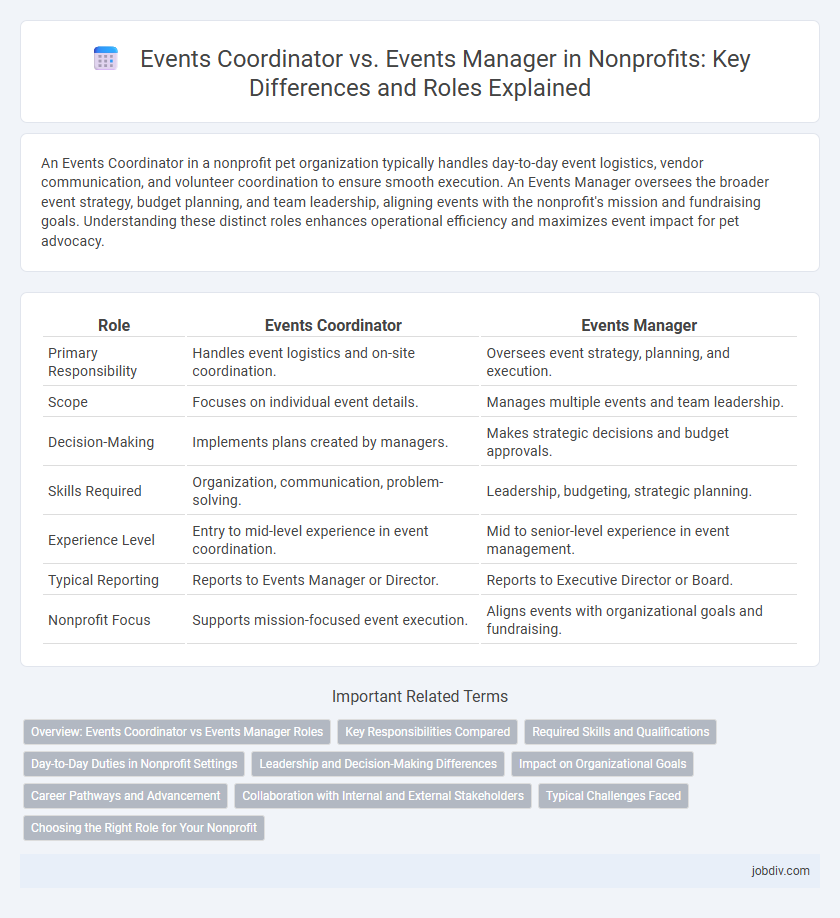An Events Coordinator in a nonprofit pet organization typically handles day-to-day event logistics, vendor communication, and volunteer coordination to ensure smooth execution. An Events Manager oversees the broader event strategy, budget planning, and team leadership, aligning events with the nonprofit's mission and fundraising goals. Understanding these distinct roles enhances operational efficiency and maximizes event impact for pet advocacy.
Table of Comparison
| Role | Events Coordinator | Events Manager |
|---|---|---|
| Primary Responsibility | Handles event logistics and on-site coordination. | Oversees event strategy, planning, and execution. |
| Scope | Focuses on individual event details. | Manages multiple events and team leadership. |
| Decision-Making | Implements plans created by managers. | Makes strategic decisions and budget approvals. |
| Skills Required | Organization, communication, problem-solving. | Leadership, budgeting, strategic planning. |
| Experience Level | Entry to mid-level experience in event coordination. | Mid to senior-level experience in event management. |
| Typical Reporting | Reports to Events Manager or Director. | Reports to Executive Director or Board. |
| Nonprofit Focus | Supports mission-focused event execution. | Aligns events with organizational goals and fundraising. |
Overview: Events Coordinator vs Events Manager Roles
Events Coordinators primarily handle logistical details such as scheduling, vendor communication, and on-site event support, ensuring smooth execution of nonprofit events. Events Managers take on a strategic role, overseeing budget management, team leadership, and overall event planning alignment with organizational goals. Both roles are critical in nonprofit event success, with Coordinators focusing on operational tasks and Managers driving programmatic impact and stakeholder engagement.
Key Responsibilities Compared
An Events Coordinator in a nonprofit focuses on logistical tasks such as scheduling vendors, managing event registration, and coordinating volunteers to ensure smooth execution. In contrast, an Events Manager oversees strategic planning, budget management, and stakeholder engagement to align events with organizational goals. Both roles require strong communication skills, but the manager emphasizes leadership and long-term event success.
Required Skills and Qualifications
Events Coordinators typically require strong organizational skills, attention to detail, and proficiency in scheduling software, along with excellent communication abilities to liaise with vendors and volunteers. Events Managers demand advanced leadership skills, strategic planning experience, budget management expertise, and the ability to oversee large teams and complex projects within nonprofit organizations. Both roles benefit from knowledge of event logistics, fundraising strategies, and stakeholder engagement, but Events Managers often need a bachelor's degree in nonprofit management or business administration, while Coordinators may only require relevant experience or certification.
Day-to-Day Duties in Nonprofit Settings
Events Coordinators in nonprofit settings handle the logistical details of events, including scheduling, vendor communication, and volunteer management to ensure smooth execution. Events Managers oversee broader event planning aspects, such as budgeting, strategic partnerships, and overall program goals alignment with the nonprofit's mission. While coordinators focus on operational tasks, managers concentrate on leadership and long-term event planning within nonprofit organizations.
Leadership and Decision-Making Differences
Events Coordinators in nonprofits primarily focus on executing detailed logistical tasks under guidance, demonstrating leadership through team collaboration and timely problem-solving, while Events Managers assume higher-level decision-making authority, shaping event strategies, allocating resources, and leading cross-functional teams to meet organizational goals. The decision-making scope of Events Managers includes budget approval, vendor negotiations, and crisis management, contrasting with the Events Coordinator's role in operational support and task delegation. Effective leadership in nonprofit events requires Events Managers to balance visionary planning with adaptive execution, enhancing stakeholder engagement and mission impact.
Impact on Organizational Goals
Events Coordinators in nonprofits focus on executing event logistics, ensuring smooth operation which directly supports fundraising and awareness goals; they manage vendor communication, venue setup, and attendee coordination to maximize event efficiency. Events Managers take a strategic role, aligning event objectives with organizational missions to optimize donor engagement and resource allocation, driving long-term impact. Both roles collaboratively enhance the nonprofit's ability to achieve key performance indicators related to community outreach and financial sustainability.
Career Pathways and Advancement
Events Coordinators in nonprofits typically handle logistical planning and vendor coordination, building foundational skills essential for career growth. Advancement to Events Manager positions requires strategic leadership, budget management, and team supervision expertise, marking a shift from operational to managerial responsibilities. Career pathways often include specialized training in nonprofit management and event marketing, enabling progression toward senior roles such as Director of Events or Development Manager.
Collaboration with Internal and External Stakeholders
Events Coordinators in nonprofits focus on facilitating communication and logistical details with internal teams such as fundraising, marketing, and volunteer departments to ensure event objectives align with organizational goals. Events Managers oversee broader collaboration efforts, engaging external stakeholders including sponsors, vendors, and community partners to maximize resources and enhance event impact. Both roles require strong interpersonal skills and strategic coordination to achieve seamless partnerships and successful nonprofit events.
Typical Challenges Faced
Events Coordinators typically face challenges in managing multiple low-budget events simultaneously, ensuring clear communication among diverse volunteer teams, and adhering strictly to nonprofit constraints. Events Managers encounter complexities in strategic planning, budget optimization, and stakeholder coordination while aligning events with the organization's mission and fundraising goals. Both positions require adaptability to fluctuating resources and the ability to engage community support effectively.
Choosing the Right Role for Your Nonprofit
Selecting the right role between Events Coordinator and Events Manager depends on your nonprofit's scale and event complexity. An Events Coordinator typically handles logistical tasks such as vendor communication, scheduling, and volunteer coordination, making it ideal for smaller nonprofits or individual events. In contrast, an Events Manager oversees strategic planning, budget management, and team leadership, which suits larger organizations aiming for high-impact events that drive fundraising and community engagement.
Events Coordinator vs Events Manager Infographic

 jobdiv.com
jobdiv.com